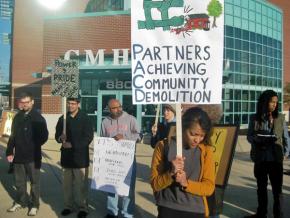Fighting to save Poindexter
reports on a demonstration to save public housing in Columbus, Ohio.
EARLY IN the morning on April 26, a group of about 30 community members and students gathered outside a meeting of the board of trustees of the Columbus Metropolitan Housing Authority (CMHA), the office that manages public housing in the city, to mount a challenge against the gentrification of the historic community of Poindexter Village.
Poindexter is one of the nation's oldest public housing projects and a primary target of the city of Columbus's redevelopment plans for the predominately poor and African American Near East Side. Earlier this year, CMHA concluded its removal of all the community's 1,200 residents without providing any guarantee of new housing--beyond the provisioning of "housing choice" vouchers for a shrinking stock of housing that they openly admit already had a staggering waiting list.
The development process has been a project of a coalition of the city of Columbus, CMHA and the Ohio State University, which together have pledged $1.25 million over five years to demolish and redevelop the area. OSU alone has pledged an additional $10 million over ten years in return for a tax break from the city.

Their goal is simple: "to create an environment in the community that stimulates investment and growth," according to CMHA president and CEO Charles Hillman--in other words, to put the needs of profitability over the housing needs and welfare of over a thousand people.
This was the focus of the energetic members of the community activist organization Coalition for Responsible Development in the Near East Side. The coalition and the protesters who came out in solidarity, including Ohio State students, represented significant diversity in terms of race, class, age, political leanings and place of residence. The major role of OSU in the process provided students with a clear reason to participate.
Protesters occupied the space in front of the CMHA headquarters, demanding that they adopt a community benefit agreement (CBA), a legally binding contract that would guarantee the hiring of local workers and distribute some of the profits within the community. They chanted slogans such as "What do we want? CBA! When do we want it? Now!" and "They say demo? We say hell no!" as board members sheepishly entered into the meeting.
THE MOTIVATIONS for participation varied significantly within the group. "Poindexter is our history; it was the promise of the Great Migration," long-time Poindexter resident Reta Smith said, referencing the historic movement of African Americans from the rural South to the urban North following Emancipation.
Echoing this point, Brother Asifah Osmasa, who also lived in Poindexter, said he was interested in "preserving the history of African Americans and providing low-income people with jobs."
Taking a different angle, community housing activists Amber Evans and Laura Tompkins said that they are involved because they believe in the need for community, rather than corporate, control of housing. "There is a development machine in Columbus, and every time people throw wrenches into the process makes the city a better place," Tompkins said.
Pranav Jani, a member of the International Socialist Organization (ISO), a professor of English at OSU and an active member in the coalition spoke to the history of racial and economic inequality in urban development, saying, "We talk a lot about global vision and diversity at Ohio State. Then how can we remain silent when our own university participates in a project that will devastate the African American community?"
Verbz Vegas, also a member of the ISO and resident of Columbus's East Side, added: "I'm sick and tired of watching history, community, and culture being decimated by profiteers hiding behind euphemisms like 'redevelopment.'"
After about 45 minutes of protesting, CMHA invited activists to sit-in on the board meeting. A half-dozen community activists entered while the rest of the group continued to demonstrate outside. Although activists got their demand for a CBA on public record, CMHA officials made no guarantee to sign one, ambiguously promising to consider it sometime in the future.
The anti-gentrification activism over the last few years has been full of both victories and setbacks. Although activists understand the difficulty of winning this fight, as demolition is scheduled within weeks, they all expressed a desire to continue organizing for housing justice in Poindexter Village and elsewhere, as the City of Columbus and OSU begin similar efforts in the historic Weinland Park community and other areas in the Near East Side.


